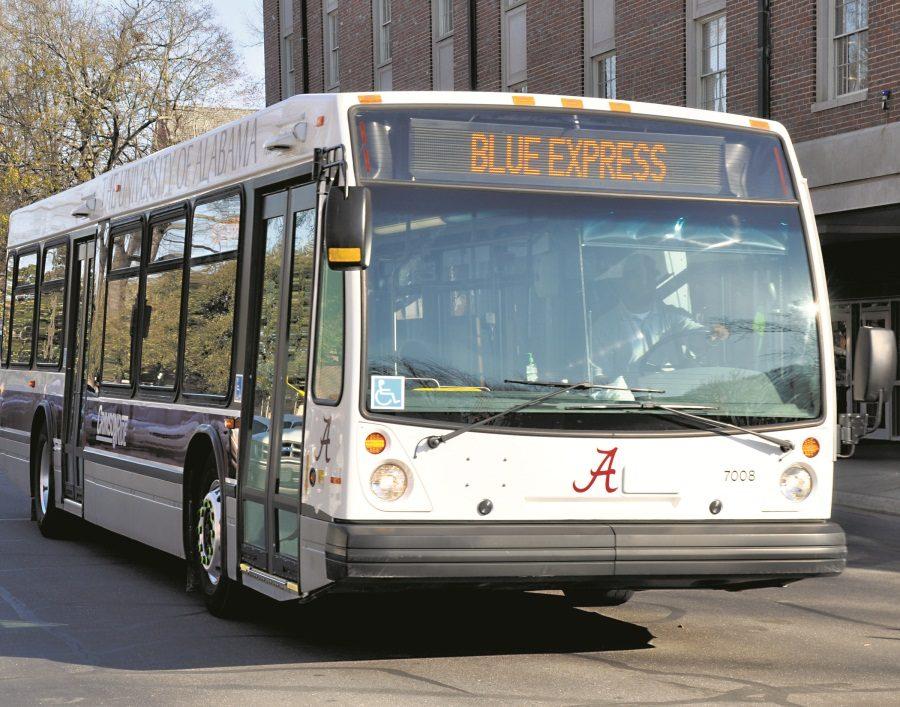 Some UA students are showing their support for CrimsonRide bus drivers through call-ins today, a day before the bus drivers try to negotiate a new contract with their parent company. First Transit.
Some UA students are showing their support for CrimsonRide bus drivers through call-ins today, a day before the bus drivers try to negotiate a new contract with their parent company. First Transit.
Currently the 50 to 60 drivers who work for CrimsonRide are demanding fair wages from First Transit, which provides bus drivers for the UA campus bus system.
CrimsonRide bus drivers are not UA employees. They work under contract with First Transit, a transportation company. The University pays First Transit $55 an hour per driver, and each driver receives only $9.50 of that amount.
In May 2009, the drivers voted to unionize under the Amalgamated Transit Union, but First Transit has stalled contract negotiations, according to union officials.
Kenneth Kirk, international vice president for the union, said it is important that students realize what the bus drivers are fighting for. “All we want is what’s fair,” Kirk said.
According to a news release sent out by ATU, it was reported last November that FirstGroup PLC, the parent company of First Transit, had earnings of more than $200 million over the previous six months.
In addition, Kirk said First Transit has not handled the situation fairly.
“They want us to go on strike,” Kirk said. “We don’t want to strike. People have to pay their bills, so we can’t afford to strike.”
An ATU representative will meet with First Transit Thursday in Tuscaloosa to negotiate fairer contracts for the drivers. Kirk said no proposals have been announced yet.
The same news release, which was released the same week as the national championship game, said bus drivers at the University of Texas, who are also on contract with First Transit, are paid $11.25 with the potential to rise up to $17 an hour.
In prior years, Kirk said, it was possible for a driver, after a couple of years on the job, to receive a substantial raise, sometimes going as high as $15 per hour. However, Kirk said that what CrimsonRide drivers make now is close to the poverty line, not including the little-to-no vacation time and poor health care coverage.
Student Involvement
Jake DaSilva, a graduate student majoring in library information studies and a member of the Student Labor Action Movement, said he is trying to help the group of drivers find their voice by making a documentary about the situation in hopes that what is recorded will make First Transit change its policies.
DaSilva and other members of the Labor Action Movement have been interviewing bus drivers, a pastor who is connected with the drivers and union representatives from the ATU.
“[We talked to] people like that who helped these workers here to get organized so that they can all have one voice together in advocating for their living wage,” Dasilva said.
DaSilva said he expects the film to be finished about two months before the new contract is signed. According to federal law, the drivers have one year to negotiate a contract with First Transit.
Jenae Stainer, a junior majoring in social work and a member of Students for a Democratic Society, has been focused on supporting the drivers as well.
“We have a Facebook group and an online petition, but riding the buses is the main thing that we’ve done,” Stainer said.
The organization asked students to call UA President Robert Witt and ask for support in campaigning for the bus drivers.
“I know that a lot of students might be nervous to call, but we plan on going around with a script,” Stainer said. “He has the power to put pressure on the corporation to negotiate with the bus drivers.”
DaSilva said he thinks students should care about the campaign.
“As students, we’re part of the University community,” DaSilva said. “We’re an integral part, and we have to be good stewards of our community and make sure that the University is a good place not just to study, but for people to work. We all have to look out for each other.”
Stainer said she feels students have more power to make change than they realize.
“We make a lot of decisions on campus whether we know it or not,” Stainer said. “If a lot of students express their anger or outrage about the fact that our drivers don’t make what they deserve, then the administration is going to listen to that.”







